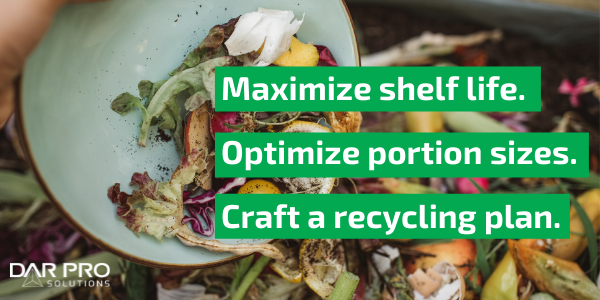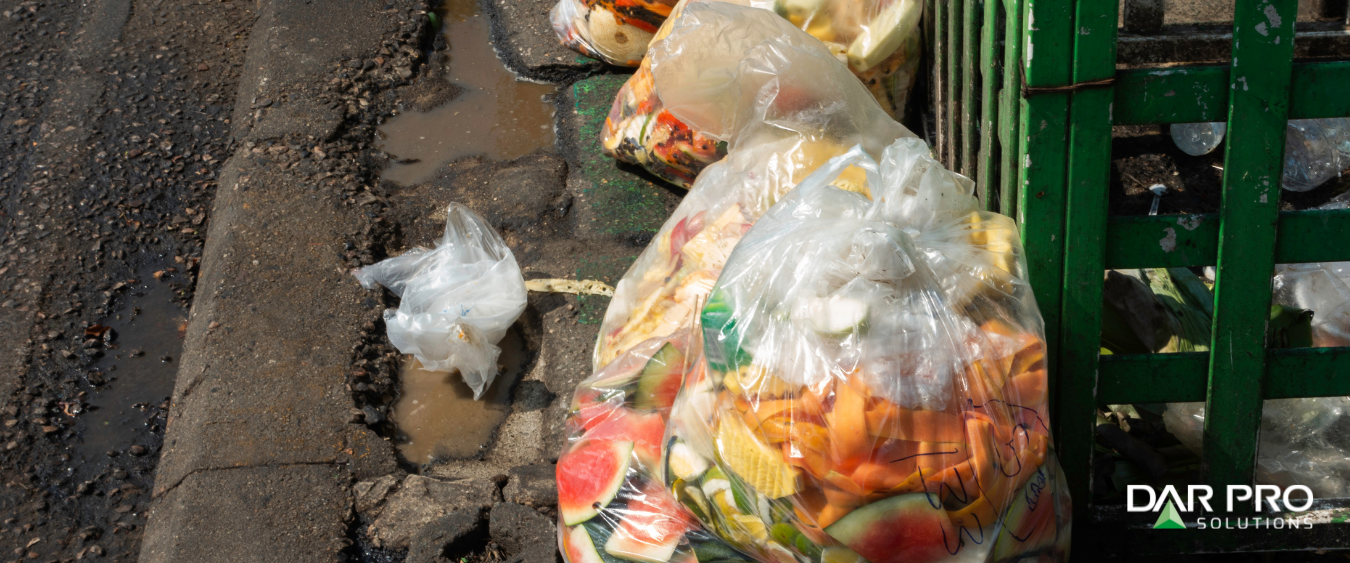1. Restaurants

Evaluate inventory and maximize shelf life - Make sure your food inventory method is as efficient as possible. If you have ingredients that are sitting around going unused, you are needlessly contributing to your total food waste output. Why waste ingredients before you have a chance to use them? Make sure perishables are properly stored so that you’re not wasting ingredients before they are even cooked.
Portion control – Making sure your dishes are served in reasonably sized portions is one of the quickest ways to reduce food waste. If your dine-in customers are regularly not finishing their food, it is likely a sign that your portions are too large. Work to optimize your portion sizes to minimize the amount of food thrown away, and in turn, reduce your overall waste output.
Craft a recycling plan – Of all the food-related waste a restaurant produces, much of it can be recycled. Consider donating your restaurant’s leftover food to a local food bank or some other organization that will repurpose it. The frying oil you use to make your food can also be recycled. If you partner with a reputable used cooking oil recycling provider, your oil can help produce renewable diesel – a cleaner burning alternative to petroleum fuel that reduces carbon emissions by up to 85 percent. Looking for ways to proactively recycle within your kitchen will reduce food waste.
2. Stadiums and arenas
Donate unused stadium food. Similar to the previous note for restaurants, stadiums and arenas are notorious for having a lot of unused food that turns into waste. This is largely due to it being harder to optimize inventory for stadiums and arenas. Think about the varying crowd sizes, numerous homestands and an irregular schedule, it can be difficult to pinpoint just how much food is needed per order. Donating to local food banks and homeless shelters is a safe and effective way to minimize the amount of food stadiums discard.

Having the right equipment – Having adequate equipment is key in keeping the food you make fresh. If a stadium produces a set amount of food, but it goes bad before the concession stand can sell it, then its overall food waste output is needlessly larger. Having warming stands, proper refrigeration and other storage mechanisms for ready-made concession item is an important component of reducing food waste.
Get your guests involved - Encourage fans and attendees to join in on your recycling efforts. Aggressive signage and regularly available recycling bins across the concourse will help with this. Offer incentives for your staff and guests to join in on your stadium’s collective recycling efforts. Advertise the results during the game or event. The more people you can get involved in your recycling effort, the more effective it will be.
3. Industrial facilities
Render your inedible meat byproducts – the scraps and inedible byproduct used to produce food at industrial facilities can be recycled and repurposed. Partnering with a rendering service will make life easier for your facility and give the food waste it produces a renewed purpose. These scraps can be turned into ingredients used in a variety of consumer products. A reputable service provider will collect the material for you and ensure it is given that renewed purpose.

Better optimize forecasting – improving forecasting on perishable ingredients and with labeling will work to the benefit of both the plant and where the product goes next at the consumer level. Similar to inventory in a restaurant kitchen, manufacturing plants sometimes miscalculate the amount of raw ingredients needed to meet their product quota. When a plant ends up needing less, the ingredients usually go to waste.
Secondly, product labeling at the manufacturing level will help consumers. Date labels can be confusing to consumers. Instead of using a range of date labels that include terms like "sell by", "best before", "use by" or "expires on,” which is a more straightforward, standardized labeling method can make it clear to the consumer whether the date indicates spoilage or just that the product is outside the window of peak quality.
4. Supermarkets

Zero waste grocery stores – Zero waste grocery stores are an increasingly popular concept within the supermarket industry that is contributing to minimizing food waste. The stores eliminate packaging and bags customers use to get their grocery groceries, instead requiring customers to bring their own reusable bags into the store collect the items they need. This concept features a warehouse or market-style layout in which most items are not wrapped in individual packaging and are bought in bulk.
Partnering locally – Buying products from local farmers is one way both traditional and zero-waste grocery stores are reducing food waste. Nearly 70 percent of crops grown are unharvested in fields every year. By partnering with local farmers, supermarkets can have a better grip on what is needed from a supply standpoint and how much is needed, which in turn reduces the number of crops that are left unharvested. Buying local is the best way to supply grocery stores.
Solving the food waste problem in America will require all facets of the food service industry to do their part. These are just a few of the many ways the various sectors of the food service industry can reduce their overall food waste output. Reach out to a DAR PRO representative today and find out how your business can benefit from our program. Call us 24/7/365 at 855-DAR-PRO1 (855-327-7761).
Contact Sales
For customer service inquiries call our toll free number (855) 327-7761
By submitting this form I agree to the privacy policy including the usage of contact details to contact me for marketing purposes.
